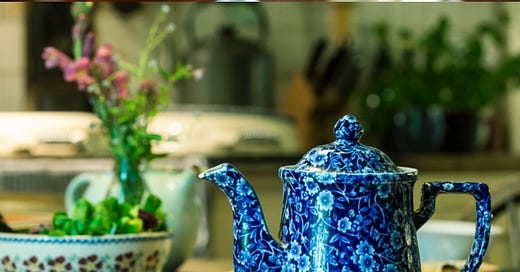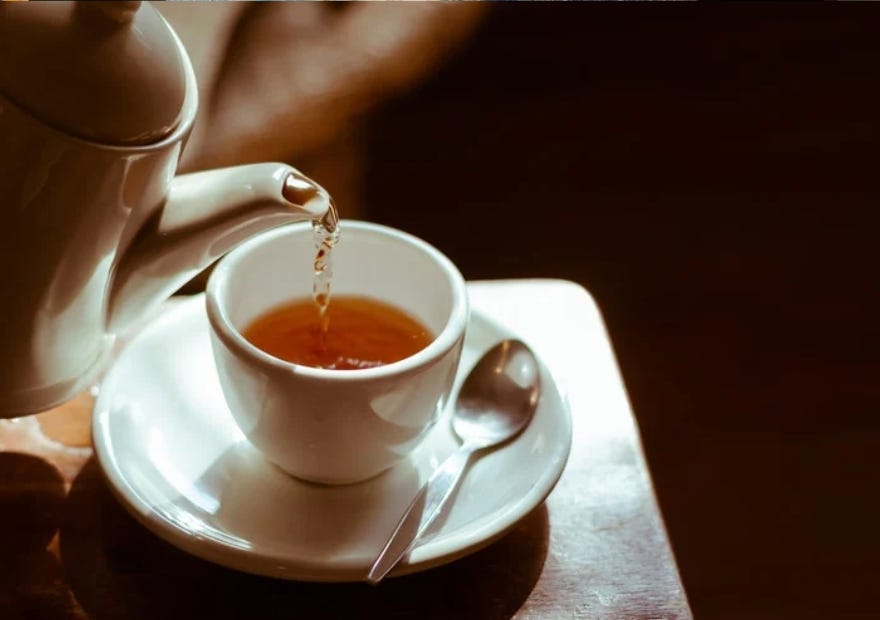A Kerfuffle Prequel…
The teapot came into the Whitby family in 1789. It was already ancient by then. Prudence Whitby acquired it on a fog-shrouded morning from a peculiar shop that, when she returned the following day for matching saucers, had mysteriously disappeared from between the butcher and the milliner.
The shopkeeper had been a wrinkled woman with eyes the color of thunderclouds. She spoke with an accent Prudence couldn't place. "This pot," the woman said, her gnarled finger tracing the delicate blue filigree, "finds its way to those who need it most."
"It's just a teapot," Prudence had replied. Though an unusual warmth emanated in her hands as they caressed the porcelain curves.
"Nothing is just anything, my dear," the woman answered with a knowing smile. "Especially not items that hold tea."
Prudence was not yet a hedge witch when she bought the teapot. She was simply the unmarried daughter of a country solicitor with a fondness for Earl Grey. She maintained a secret garden of unusual herbs her neighbors politely pretended not to notice. Magic was in her blood. It passed down through generations of Whitby women who had quietly healed and helped when doctors were scarce or ineffective.
The first time the teapot revealed its nature was during the winter of 1793. A terrible influenza swept through the village. Prudence brewed a medicinal tea using her most potent herbs, feverfew, elderberry, and a strange silver-leafed plant she'd never been able to name. As she poured from the blue-patterned pot, she whispered without thinking, "Heal them, warm them, hold them safe."
The tea that poured into the cups steamed with an otherworldly glow. Those who drank it not only recovered from their illness within hours but reported dreams of floating among stars and dancing with forgotten ancestors.
That night, Prudence set the teapot on her kitchen table and stared at it in the candlelight.
"What exactly are you?" she asked, feeling only slightly foolish for addressing porcelain.
The teapot didn't answer. Not with words, but its surface rippled like water. For a brief moment, Prudence saw reflected not her own face but that of the strange shopkeeper. She winked before the image faded back to blue-and-white glaze.
Over the years, Prudence learned to work with the teapot's magic rather than question it. Together, they brewed concoctions that eased childbirth, calmed troubled minds, and occasionally (though Prudence would never admit this to the vicar) helped young couples fall properly in love when their parents had arranged less suitable matches.
The trouble came in 1819. Magistrate Baldwin launched his infamous "cleansing" of what he called "country superstitions." Three women in neighboring villages had already been arrested for practices far more innocent than Prudence's teas. The magistrate's men were reportedly searching homes for "instruments of unnatural influence."
On a storm-tossed night with thunder cracking overhead, Prudence made a decision. She would bind the teapot's more obvious magical properties. Not to destroy its power, but to protect it. And to protect her daughter, Mary, who was showing signs of the same intuitive abilities.
By candlelight, as wind howled through the garden, Prudence performed the binding ritual. She brewed a tea of rowan berries, salt, moonflower, and three drops of her own blood. As she poured it into the pot rather than out of it, she chanted:
"Slumber deep but never fade,
Hide your gifts in light and shade.
Wake only when disorder reigns,
When chaos bends world-holding chains.
Protect our line through time's long march,
Until true need forms heaven's arch."
Lightning struck as she spoke the final word. The teapot shuddered on the table. Its blue pattern glowed briefly before dimming to an ordinary glaze. When Prudence poured tea the next morning, it was just tea. Still delicious, still comforting, but without the shimmer of magic.
Magistrate Baldwin's men searched the Whitby cottage a week later. They found nothing but an eccentric spinster with a fondness for gardening and a pretty blue teapot. The lead investigator's wife admired it so much that Prudence felt compelled to compliment it extensively, ensuring they would never think to confiscate something so prominently admired.
Prudence passed the teapot to Mary upon her death. Along with a sealed letter explaining its true nature and the conditions of its binding. Mary passed it to her daughter, and so it continued, the knowledge of what the teapot truly was fading with each generation until it became simply "the family heirloom" rather than "the sleeping magic."
By the time Eleanor Whitby inherited it in the mid-20th century, the letter had been lost. Most likely in a move two generations earlier. The family's hedge witch heritage had been deliberately obscured during the Victorian era. Eleanor's great-grandmother had married into respectability and found it easier to abandon herb lore for social standing.
Eleanor grew up knowing only that the teapot was valuable and never to be used except for the most special occasions. What she didn't know was that "special" had a specific magical definition in the binding spell. Moments when order needed disruption. When the too-rigid structures of the world required a gentle shattering.
For years, the teapot sat quietly in Eleanor's china cabinet as she grew into the most ordered, structured woman in the village. She became the perfect vessel for chaos, though she would have been horrified to think so. Her life so meticulously arranged that the slightest disruption would create maximum effect.
The Ladies' Historical Society meeting was precisely such a perfect storm. Eleanor at her most rigid, the town at its most structured, modern life at its most disconnected from natural rhythms and ancient magics. Indeed. The perfect storm.
When that single drop formed the map of Africa, the continent where humans first arose, where chaos and creation first danced together, the binding spell recognized its moment. The magic that Prudence had tucked away for safekeeping finally found the disorder it was meant to create.
And Eleanor—proper, perfect Eleanor—discovered that she was, after all, her many-times-great-grandmother's descendant. The magic hadn't skipped her; it had merely been waiting for her.
After the day of the Great Kerfuffle, Eleanor began tentatively exploring the teapot's abilities. She found Prudence's garden journal hidden in the attic. Its pages revealing themselves only when sprinkled with tea from the enchanted pot. Slowly, she began to reclaim her heritage. She planted strange seeds in her back garden and invited the Ladies' Historical Society to tea ceremonies that left them feeling curiously rejuvenated.
The teapot remained temperamental. It worked only when it chose to and often with results Eleanor hadn't intended. But that, she came to understand, was the point. Some magic couldn't be controlled or scheduled. It existed to remind humans that beneath their carefully constructed order, lay the wild, wonderful chaos from which all creation sprang.
And on quiet evenings, Eleanor could sometimes hear whispers from the pot. The voice of Prudence, perhaps, or something older still, telling stories of hedge witches and thunder-eyed shopkeepers, of binding spells and teacups that danced among the stars.
The Kerfluffle Story…






LOVE this! So eloquent & magical!
What a great little story! Thank you for writing this!